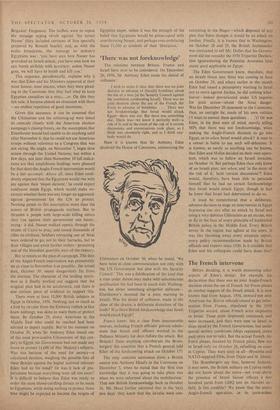'There was not foreknowledge'
The relations between Britain, France and Israel have now to be considered. On December 20, 1956, Sir Anthony Eden made his denial of collusion :
I wish to make it clear that there was no joint decision in advance of [Israeli] hostilities about the use of a veto [at the Security Council against the resolution condemning Israel]. There was no joint decision about the use of the French Air Force in advance of hostilities. . . • There was not foreknowledge that Israel would attack Egypt—there was not. But there was something else. There was—we knew it perfectly well—a risk of it, and in the event of the risk of it certain discussions and conversations took place, as I think was absolutely right, and as I think any- body would do.
Now it is known that Sir Anthony Eden deceived the House of Commons, announcing the
Ultimatum on October 30, when he stated, 'We have been in close communication not only with the US Government but also with the Security Council.' This was a falsification of the kind that a man under duress may make with subconscious justification (he had been in touch with Washing- ton, but about something altogether different-- Eisenhower's demand for a joint warning to Israel). Was his denial of collusion, made at the close of the drama, a deliberate distortion of the truth? Was there British foreknowledge that Israel would attack Egypt?
France knew; this is clear from innumerable sources, including French officials' private admis- sions that Israeli staff officers worked in the Defence Ministry for days before the attack. But Britain? Does anything corroborate the Brom- bergers' flat assertion that a French general told Eden of the forthcoming attack on October 15?
The only concrete admission from a British source was Anthony Head's in the Commons on December 5, when he stated that the 'first true knowledge that it was going to take place was when we were informed about the mobilisation.' That sets British foreknowledge back to October 26. Mr. Head further admitted that in the 'next two days' they knew that the Israelis were con- centrating in the Negev—which disposed of any plea that Eden thought it would be an attack on Jordan. Finally, it is known that in Washington, on October 28 and 29, the British Ambassadoi. was instructed to tell Mr. Dulles that his Govern- ment did not consider the 1950 Tripartite Declara- tion (guaranteeing the Palestine Armistice lines status quo) applicable to Egypt.
The Eden Government knew, therefore, that an Israeli thrust into Sinai was coming at least on October 28; and where earlier in the month Eden had issued a peremptory warning to Israel not to move against Jordan, he did nothing what- soever—indeed prevaricated under US requests for joint action—about the Sinai danger, Was his December 20 statement to the Commons, then, an outright lie, made of his own volition CI want to answer these questions . . .')? Or was Eden, in his then state of mind, merely telling MPs that there was not foreknowledge, when making the Anglo-French decision to go into Egypt, as to when Israel would attack? A man in a corner is liable to use such self-delusions. It is known, as surely as anything can be known, that Eden and Mollet decided on their own opera- tion, which was to follow an Israeli invasion, on October 16. But perhaps Eden then only knew of an Israeli plan; not when; and 'in the event of the risk of it,' held 'certain discussions'? Eden would, therefore, have been able to persuade himself that he had no certain foreknowledge that Israel would attack Egypt, though in fact he knew that Israel had determined to do so.
It must be remembered that a deliberate, advance decision to stage an intervention in Egypt beginning one day after an attack by Israel and using a very dubious Ultimatum as an excuse, was to fly in the face of every principle of traditional British policy in the Middle East. Every British envoy in the region was aghast at the news. It was like throwing away every situation report, every policy recommendation made by British officials and experts since 1920. Is it credible that Eden and his colleagues could have done this?










































 Previous page
Previous page